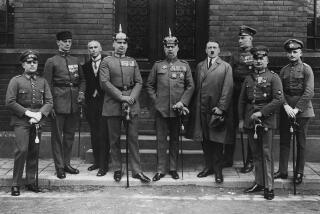Yeltsin Lawyer Urges Court to Uphold Communist Ban
- Share via
MOSCOW — Delivering a sweeping indictment of 70 years of Communist rule, President Boris N. Yeltsin’s top lawyer urged a special court Wednesday to uphold Yeltsin’s ban on the party that became “the most powerful organization of the 20th Century.”
The lawyer, Sergei M. Shakhrai, ran through a devastating list of party crimes ranging from the mass slaughter of private farmers to the invasion of Afghanistan, the repression of dissidents and the plotting of last August’s coup attempt.
As Shakhrai described it, the Communist Party drowned in its own evil, and Yeltsin’s decrees banning it last summer only finished it off.
“The Communist Party lost power. Having lost power, it lost its meaning,” he said. “Without the atmosphere of general fear, having breathed in the air of freedom, this organization died.”
Shakhrai was presenting his opening arguments before the 13 judges of Russia’s new Constitutional Court, who have convened to rule on the constitutionality of Yeltsin’s decrees--and of the Communist Party in general. The Russian press is touting it as the trial of the century.
If the court strikes down Yeltsin’s ban on the party, the Russian president’s political standing will be shaken, and the Communists could try to reclaim billions of dollars worth of confiscated property. If the ban is upheld and the party ruled unconstitutional, Russia will have made a major step toward casting off its Communist past.
Shakhrai said he is trying to help the country avoid falling into the historical trap in which “nothing is forgotten, but nothing has been learned.”
“The defense of our position, which we will carry out based on a myriad of documents and the evidence of witnesses, will disperse the last illusions, the last adherents to Communist positions,” he said.
He made a substantial start Wednesday with a 90-minute summation of the Communist Party’s role in Russian history, jumping from one period to another to focus on targets ranging from the role of the KGB--”the repressive organs were indivisible from the party”--to the massive government funds the party bestowed upon itself.
Without going into detail, he said he would document the party’s aid to foreign Communist parties as well as its recent efforts to funnel riches into new private companies.
In the military sphere, the party should answer for the Soviet invasions of Hungary in 1956, of Czechoslovakia in 1968 and of Afghanistan in 1979, he said, as well as for dictator Josef Stalin’s deportation of hundreds of thousands of members of minorities he deemed untrustworthy.
Overall, Shakhrai told the court, “You will have to judge the most powerful organization of the 20th Century, which called itself the Communist Party of the Soviet Union.”
For all the emotional power of Shakhrai’s narrative, however, the 13 judges--all renowned jurists who were both nominated and confirmed by the Russian parliament--appeared to have serious doubts about the solidity of his arguments.
Court Chairman Valery Zorkin hinted with one question that Shakhrai’s descriptions of the Communist Party of the 1930s or 1960s may not be relevant for a ruling on the radically reformed party that was banned in 1991.
He also asked why, if the Communist Party had already collapsed, as Yeltsin’s team claims, the president should have bothered to ban it.
Another judge, Victor Luchin, went so far as to lightly mock Shakhrai for reaching conclusions about communism after living happily for so long in the system it created.
“What is this, late blooming?” Luchin asked, drawing immediate censure from Zorkin for stepping out of line.
The judges had largely been easier on Shakhrai’s opponents, a grouping of 37 pro-Communist legislators backed by their own law professors and experts.
Since the 13 court members were not selected by Yeltsin or his aides, they are generally regarded as independents. Because of their high positions in the legal system, it is likely that all or most of them were Communist Party members in the old Soviet days. But with the party now banned and in disrepute, former membership carries minimal weight.
Concluding the Communist side’s opening arguments Wednesday morning, Communist backers contended that Yeltsin had used the August coup attempt merely as an excuse to realize his long-held desire to ban the party.
And the nationalization of party property, said lawmaker Vladimir Bokov, amounted to “a totally unprecedented case, nothing short of highway robbery or the situation in Nazi Germany in 1933.”
Party defenders said they would not insist on the return of all their property, including special hospitals and health spas, but that they hoped to appeal to an arbitration court to regain their printing plants, buildings and vehicles.
The trial, held under tight security a few blocks from the Kremlin, is expected to continue for several more days, but even the lawyers running it were unable to predict how long.
More to Read
Sign up for Essential California
The most important California stories and recommendations in your inbox every morning.
You may occasionally receive promotional content from the Los Angeles Times.












